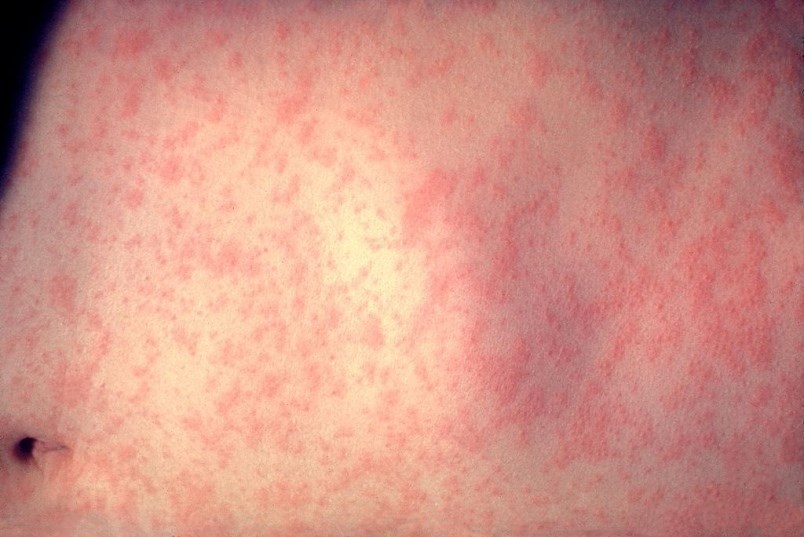More than 30 students between two Vancouver schools are being told to stay home for the time being because they either haven’t been immunized against measles, or don’t have documented proof of immunity.
There have been a total of nine reported cases of measles in Vancouver, eight of which are connected to two Francophone schools — École Rose-Des-Vents and École Jules-Verne — with no new cases reported since Feb. 15.
Staff and students at both schools have been asked to provide proof of immunity. The 33 students and one staff member who can’t, or who have not been vaccinated, are being asked to stay home until the risk of infection passes, which, if no new cases are reported, is March 7.
“If they can’t provide proof of immunity to measles, so either proof that they had measles or proof that they’re immune to measles through vaccination, then they have to stay home until there’s no longer a risk of the measles,” said medical health officer Dr. Althea Hayden.
Hayden said Tuesday that she could not confirm how many of those cases were parents who had made the choice not to vaccinate. She did say that VCH staff was able to confirm that 95.5 per cent of students at École Jules-Verne and 94 per cent at École Rose-Des-Vents had received at least one dose of the measles, mumps and rubella (MMR) vaccine. The herd immunity level for measles is 92 per cent, Hayden said.
She said the last day anyone at the schools could have been exposed to the virus was Feb. 14. With up to a 21-day incubation period, the latest anyone exposed could become sick is March 7.
As well, one of the infected individuals visited the emergency room at B.C. Children’s Hospital several times between Jan. 21 and Feb. 1 exposing another 400 to 500 children to the virus.
On Feb. 15, the health authority sent out a warning to anyone who visited the emergency room during those days and times.
The dates and times are:
- Jan. 21 between 10 a.m. and 6:10 p.m.
- Jan. 23 between 4:45 p.m. and 11:10 p.m.
- Jan. 24 between 8:13 a.m. and 11:40 a.m.
- Feb. 1 between 2:05 p.m. and 6:55 p.m.
Hayden said that the vast majority of the kids who were potentially exposed during that time would have already become ill if they were going to, and that the goal of the warning was to weed out any possible unidentified measles cases.
The first case was reported by Vancouver Coastal Health on Feb. 9. In that case, the infected person picked up the virus while traveling outside North America, VCH spokesperson Tiffany Akins said last week.
She added that the local cases are not linked to the recent measles outbreaks in Washington state and Europe.
The measles virus is highly infectious and can spread through the air when an infected person coughs or sneezes and you do not have to be in close contact with an infected individual to catch the virus.
“In general measles is the most contagious disease out there, which is part of why it’s such a big deal when we have measles in our community,” Hayden said.
The virus can survive in a closed area, like a bathroom, for up to two hours after an infected person was there. It can also be spread through sharing food, drinks or cigarettes, and kissing. Someone infected with measles is contagious for four days before they even start showing symptoms and for four days after the onset of the rash.
Symptoms include: fever, red eyes, which may be sensitive to light, cough, a runny nose and rash.
Complications from the virus include pneumonia, inflammation of the brain (encephalitis), seizures, deafness, brain damage and death.
The measles vaccine is 99 per cent effective in preventing the virus when two doses have been administered. Children born in B.C. in or after 1994 routinely get two doses of the MMR vaccine — one at 12 months old and a second dose before starting kindergarten.
Vancouver Coastal Health warns that anyone born after 1970 and before 1994, or grew up outside of B.C., may have received only one dose of the vaccine.
The vaccine is available free of charge at public health units or the City Centre Urgent Primary Care Centre (1290 Hornby St.).
The World Health Organization last month included vaccine hesitancy, the reluctance or refusal to vaccinate despite the availability of vaccines, as one of its top 10 threats to global health for 2019.
“Vaccination is one of the most cost-effective ways of avoiding disease — it currently prevents 2-3 million deaths a year, and a further 1.5 million could be avoided if global coverage of vaccinations improved,” the WHO said.
The organization notes that measles has seen a 30 per cent increase in cases globally.
“The reasons for this rise are complex, and not all of these cases are due to vaccine hesitancy. However, some countries that were close to eliminating the disease have seen a resurgence.”
Hayden had a message for those parents who are hesitant, or refuse, to vaccinate their children.
“What I want to communicate to them is that we have the best interests of their children and all the other children in our communities at heart and that’s what underlies our recommendation for them to vaccinate their kids,” she said.
“If I could not in good conscience say that the best thing for their child was to be immunized, I would have a hard time making this recommendation but I know that the safest thing for their child at an individual level is to be immunized.”
@JessicaEKerr



